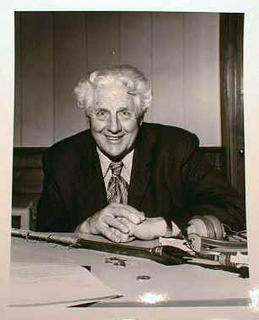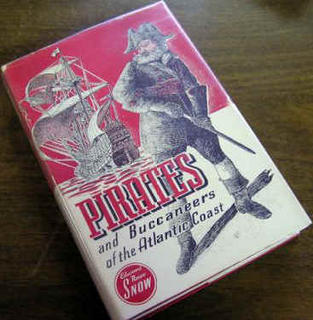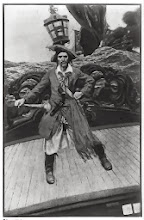The Works of Edward Rowe Snow
All my life I have been interested in history, especially local history from America's colonial period. Living in Southeastern Massachusetts is probably a big reason for the development of this fascination.  I remember going to the Mayflower as a kid, and taking school trips to the Constitution. Between field trips, family trips and hanging out in Charlestown with the Greene family, I was always surrounded by stories and physical reminders of New England's colonial past. Of course, besides the obvious interest of the revolutionary war, I was also intrigued by local tales of pirates and Indians. There is plenty of history in Massachusetts; some stands out clearly and some is less obvious. Some exists largely because of marketing and tourism, and other pieces of our past hang on despite our ignorance, fading slowly into obscurity. To anyone who is intrigued by history, especially that which inhabits the places we see everyday, I highly recommend the writings of Edward Rowe Snow.
I remember going to the Mayflower as a kid, and taking school trips to the Constitution. Between field trips, family trips and hanging out in Charlestown with the Greene family, I was always surrounded by stories and physical reminders of New England's colonial past. Of course, besides the obvious interest of the revolutionary war, I was also intrigued by local tales of pirates and Indians. There is plenty of history in Massachusetts; some stands out clearly and some is less obvious. Some exists largely because of marketing and tourism, and other pieces of our past hang on despite our ignorance, fading slowly into obscurity. To anyone who is intrigued by history, especially that which inhabits the places we see everyday, I highly recommend the writings of Edward Rowe Snow.
Snow, a native of Winthrop, Massachusetts, is famous for his books on maritime history, lighthouses along the Atlantic coast, New England legends, treasure hunting and piracy. His historical works have a flair for the dramatic that makes them immensely readable. Their topics, from the curious to the grisly, are told in a style that invokes innocent memories of ghost stories and adventure without incorporating the mundane shock value and sensationalism that many modern writers employ. Many of his works have recently been reissued as centenary editions, put together by Jeremy D'Entremont with some additional contributing material by Snow's daughter, Dolly Bicknell.
I first came across Edward Rowe Snow when researching Massachusetts Indian lore at my local public library. Indian history had always been a big interest of mine when I was younger. I remember writing one of my first book reports in school on King Philip's War. The topic truly intrigued me and I spent many days of my youth engrossed in Wampanoag history. When I heard that a place called King Philip's cave was nearby to my childhood home I begged my aunt to take me. We parked in an idle bank parking lot and walked up a short path through the woods. The trail did not lead to the Batcave I envisioned but instead to more of a rough, rocky outcropping. It was a little disappointing. The area had become a party spot for high school and college kids and was now littered with broken fragments of glass and other sundry bits of trash. Nevertheless, the thought that Philip had hid here, consulted with other Sachems, and snuck away to avoid the approaching guns of Benjamin Church's rangers kept me rapt with attention the whole time.
Several years ago I was looking for sources of local Indian history when I discovered my first Edward Rowe Snow book. I think it was Mysteries and Adventures Along the Atlantic Coast. Snow's genuine interest in his subject, his penchant for storytelling and the rooting of his tales in local places and lore got me hooked. I soon read many more of his books and became obsessed with the vanishing art of treasurehunting. I spent many a late night reading books that hadn't been checked out of their shelves in years and visited many libraries and museums I would have otherwise had no call to see. I still recall the first day that I held a three-hundred year old treasure map in my hands, wondering about the shaky brown script and the thoughts that sparked those words, so many years ago. Perhaps the biggest debt I owe Mr. Snow, beyond the palpable joy of adventure, is the pleasure of meeting so many helpful people who, like Mr. Snow, truly enjoyed their work. From librarians to authors and arhivists, I met and corresponded with fantastic people who enjoy taking the time to help anyone with an interest in their field.
I think it was Mysteries and Adventures Along the Atlantic Coast. Snow's genuine interest in his subject, his penchant for storytelling and the rooting of his tales in local places and lore got me hooked. I soon read many more of his books and became obsessed with the vanishing art of treasurehunting. I spent many a late night reading books that hadn't been checked out of their shelves in years and visited many libraries and museums I would have otherwise had no call to see. I still recall the first day that I held a three-hundred year old treasure map in my hands, wondering about the shaky brown script and the thoughts that sparked those words, so many years ago. Perhaps the biggest debt I owe Mr. Snow, beyond the palpable joy of adventure, is the pleasure of meeting so many helpful people who, like Mr. Snow, truly enjoyed their work. From librarians to authors and arhivists, I met and corresponded with fantastic people who enjoy taking the time to help anyone with an interest in their field.
I am still hunting to this day and have never found so much as a single piece of eight, but I have learned so much about the rich history of New England that I feel truly enlightened by the experience. If you get a chance, pick up one of Snow's many books and let me know your favorite tale. In the future I will refer to a few of Snow's works that captured my interest and which hold special significance for those of us who live in Southeast Massachusetts. Perhaps we can discuss your picks as well. In the meantime, here are some photos of old jacket covers that adorned several of Snow's works. I highly recommend them for your own enjoyment and for a collection of great stories your kids can enjoy, as well.
If you get a chance, pick up one of Snow's many books and let me know your favorite tale. In the future I will refer to a few of Snow's works that captured my interest and which hold special significance for those of us who live in Southeast Massachusetts. Perhaps we can discuss your picks as well. In the meantime, here are some photos of old jacket covers that adorned several of Snow's works. I highly recommend them for your own enjoyment and for a collection of great stories your kids can enjoy, as well.
 I remember going to the Mayflower as a kid, and taking school trips to the Constitution. Between field trips, family trips and hanging out in Charlestown with the Greene family, I was always surrounded by stories and physical reminders of New England's colonial past. Of course, besides the obvious interest of the revolutionary war, I was also intrigued by local tales of pirates and Indians. There is plenty of history in Massachusetts; some stands out clearly and some is less obvious. Some exists largely because of marketing and tourism, and other pieces of our past hang on despite our ignorance, fading slowly into obscurity. To anyone who is intrigued by history, especially that which inhabits the places we see everyday, I highly recommend the writings of Edward Rowe Snow.
I remember going to the Mayflower as a kid, and taking school trips to the Constitution. Between field trips, family trips and hanging out in Charlestown with the Greene family, I was always surrounded by stories and physical reminders of New England's colonial past. Of course, besides the obvious interest of the revolutionary war, I was also intrigued by local tales of pirates and Indians. There is plenty of history in Massachusetts; some stands out clearly and some is less obvious. Some exists largely because of marketing and tourism, and other pieces of our past hang on despite our ignorance, fading slowly into obscurity. To anyone who is intrigued by history, especially that which inhabits the places we see everyday, I highly recommend the writings of Edward Rowe Snow.Snow, a native of Winthrop, Massachusetts, is famous for his books on maritime history, lighthouses along the Atlantic coast, New England legends, treasure hunting and piracy. His historical works have a flair for the dramatic that makes them immensely readable. Their topics, from the curious to the grisly, are told in a style that invokes innocent memories of ghost stories and adventure without incorporating the mundane shock value and sensationalism that many modern writers employ. Many of his works have recently been reissued as centenary editions, put together by Jeremy D'Entremont with some additional contributing material by Snow's daughter, Dolly Bicknell.
I first came across Edward Rowe Snow when researching Massachusetts Indian lore at my local public library. Indian history had always been a big interest of mine when I was younger. I remember writing one of my first book reports in school on King Philip's War. The topic truly intrigued me and I spent many days of my youth engrossed in Wampanoag history. When I heard that a place called King Philip's cave was nearby to my childhood home I begged my aunt to take me. We parked in an idle bank parking lot and walked up a short path through the woods. The trail did not lead to the Batcave I envisioned but instead to more of a rough, rocky outcropping. It was a little disappointing. The area had become a party spot for high school and college kids and was now littered with broken fragments of glass and other sundry bits of trash. Nevertheless, the thought that Philip had hid here, consulted with other Sachems, and snuck away to avoid the approaching guns of Benjamin Church's rangers kept me rapt with attention the whole time.
Several years ago I was looking for sources of local Indian history when I discovered my first Edward Rowe Snow book.
 I think it was Mysteries and Adventures Along the Atlantic Coast. Snow's genuine interest in his subject, his penchant for storytelling and the rooting of his tales in local places and lore got me hooked. I soon read many more of his books and became obsessed with the vanishing art of treasurehunting. I spent many a late night reading books that hadn't been checked out of their shelves in years and visited many libraries and museums I would have otherwise had no call to see. I still recall the first day that I held a three-hundred year old treasure map in my hands, wondering about the shaky brown script and the thoughts that sparked those words, so many years ago. Perhaps the biggest debt I owe Mr. Snow, beyond the palpable joy of adventure, is the pleasure of meeting so many helpful people who, like Mr. Snow, truly enjoyed their work. From librarians to authors and arhivists, I met and corresponded with fantastic people who enjoy taking the time to help anyone with an interest in their field.
I think it was Mysteries and Adventures Along the Atlantic Coast. Snow's genuine interest in his subject, his penchant for storytelling and the rooting of his tales in local places and lore got me hooked. I soon read many more of his books and became obsessed with the vanishing art of treasurehunting. I spent many a late night reading books that hadn't been checked out of their shelves in years and visited many libraries and museums I would have otherwise had no call to see. I still recall the first day that I held a three-hundred year old treasure map in my hands, wondering about the shaky brown script and the thoughts that sparked those words, so many years ago. Perhaps the biggest debt I owe Mr. Snow, beyond the palpable joy of adventure, is the pleasure of meeting so many helpful people who, like Mr. Snow, truly enjoyed their work. From librarians to authors and arhivists, I met and corresponded with fantastic people who enjoy taking the time to help anyone with an interest in their field. I am still hunting to this day and have never found so much as a single piece of eight, but I have learned so much about the rich history of New England that I feel truly enlightened by the experience.
 If you get a chance, pick up one of Snow's many books and let me know your favorite tale. In the future I will refer to a few of Snow's works that captured my interest and which hold special significance for those of us who live in Southeast Massachusetts. Perhaps we can discuss your picks as well. In the meantime, here are some photos of old jacket covers that adorned several of Snow's works. I highly recommend them for your own enjoyment and for a collection of great stories your kids can enjoy, as well.
If you get a chance, pick up one of Snow's many books and let me know your favorite tale. In the future I will refer to a few of Snow's works that captured my interest and which hold special significance for those of us who live in Southeast Massachusetts. Perhaps we can discuss your picks as well. In the meantime, here are some photos of old jacket covers that adorned several of Snow's works. I highly recommend them for your own enjoyment and for a collection of great stories your kids can enjoy, as well.



